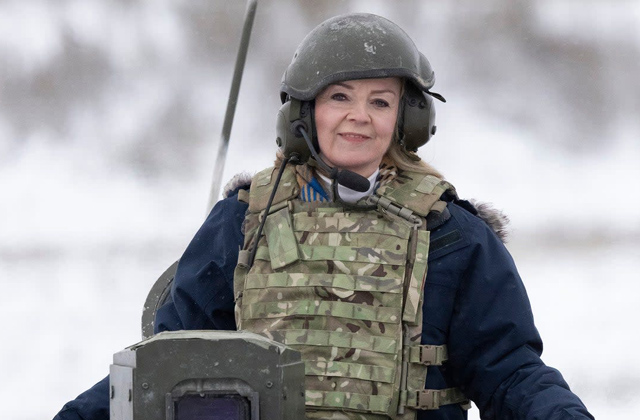The strong stance on Russia and China, along with promises of increased defence spending, may lead to a more forward international role for Britain on Truss’s watch, writes Kim Sengupta
Some of Liz Truss’s forays into foreign affairs and international trade have led to mirth and been held up as examples of her risible lack of international knowledge and gravitas on geopolitics.
There was the time she told Russia‘s foreign minister, Sergei Lavrov, that Britain would never accept Moscow’s control over the regions of Rostov and Voronezh, both in Russia, confusing them apparently with Donetsk and Luhansk in occupied Ukraine.
Then there was an impassioned diatribe on the cheese deficit and world trade, decrying British weakness for European varieties – edam, camembert and pecorino – and declaring “That. Is. A. Disgrace”. She had also bemoaned a pork imbalance in the same speech at a Conservative Party conference.
At the Bastille Day celebration at the French ambassador’s home in London, which took place during the Tory leadership election, and which the foreign secretary missed, a northern European diplomat was heard wondering “when the ham and cheese lady” was coming.
Truss laid out her broader vision of Britain in the world in a speech at Chatham House in London last year. She spoke of the need for a “confident, outward-looking, patriotic and positive” country that rather than being “racked with shame” about its colonial past “should be proud again of what we are and what we stand for”.
The declaration was portrayed as Truss attempting to channel her inner Margaret Thatcher. Since then, the former Lib Dem activist, who had decried Thatcherism in her young days, has taken to emulating Thatcher imagery, ranging from posing on a tank to displaying a penchant for pussy-bow blouses.
As prime minister, Truss faces a world which has reverted back – in many ways – to when Thatcher first came to power, but with added dangers. Russia is once again the enemy, but the armed stand-off between Nato and the Warsaw Pact of the Cold War has been replaced by a hot one in the heart of Europe.
The recent death of Mikhail Gorbachev, the last leader of the Soviet Union, who Thatcher said “she could do business with”, comes as the era of rapprochement between the Kremlin and the West seems to be over for the time being. There is now also a new adversary for the West, one which was not seen as a serious threat in Thatcher’s time. China, the power the US and its allies were starting to focus on before the Ukraine conflict, is going to continue to grow as an economic and military rival with ambitions not limited to east Asia.
The Truss government will also have to face acrimonious relations closer to home, with the European Union, in the toxic landscape following Brexit – something Thatcher did not have to contend with, even if she did have a few “handbagging” sessions with Brussels during her time in office. Hostilities with the European Union will have wider international implications if Truss activates Article 16 of the Northern Ireland protocol, as has been mooted. This will impact on the Northern Ireland peace deal and is likely to draw in the US which has warned repeatedly about the consequences of any threat to the Good Friday Agreement.
Liz Truss is more hawkish on China than Boris Johnson, who seemed to be wary of damaging economic links with the country
President Joe Biden has stressed the imperative of preserving the deal, of which America is a guarantor, pointing out that, among other things, “ any trade deal between the US and UK must be contingent upon respect for the agreement and preventing a hard border”.
Truss will not suffer from the disdain some in the current US administration felt for Boris Johnson because of his continuing cosying up to Donald Trump when he was in the White House, and the lack of effort by the Johnson government to build bridges with Biden and his team during the 2020 presidential election campaign. But Truss will lack the “special relationship” Thatcher had with Ronald Reagan when she was in power. The only real fallout between the pair took place when the US president failed to consult her before invading Grenada, a Commonwealth country.
Thatcher, too, was accused of lack of knowledge on foreign affairs. During the signing of the Sinai Accord between Egypt and Israel, Jonathan Aitken regaled a dinner party in Beirut with the quip that the British prime minister “knew so little about the Middle East that she probably thinks that Sinai is the plural of sinus”. The remark appeared in Private Eye, and Aitken, a backbench Tory, had to apologise to No 10.
Whatever her limitations on Middle East geopolitics, Thatcher was adamant about the need for action after Saddam Hussein invaded Kuwait, urging George HW Bush not to get “wobbly”, and sending British troops to join the Americans in the Gulf. She had, however, been removed from office by her own MPs by the time the first Gulf war had started.
Another war had saved her premiership in the early days, when retaking the Falklands dramatically reversed her plummeting popularity at home, and which laid the foundation for the prolonged electoral success to follow.
Truss is also going to be a wartime prime minister. We will have to wait to see what impact the economic fallout from the Ukraine conflict, now in its sixth month, will have on public opinion in this country and her government. The new prime minister has been an enthusiastic supporter of the UK supplying weapons to Ukraine in the conflict and is popular with Volodymyr Zelensky’s government. Foreign Minister Dmytro Kuleba regularly praises her warmly on Twitter. She may inherit some of the huge popularity Johnson enjoys among the Ukrainian public.
It is difficult to firmly predict the positions on issues which will be taken by someone like Truss – who has changed some of her core beliefs more than once – from left-wing liberal to right-of-centre conservative, from committed Remainer to strident Brexiteer.
Truss began her time in the Foreign Office with a gesture of reconciliation towards the EU: an invitation to European Commission vice president Maros Sefcovic for talks. But then she reversed it for a more hardline approach. This could be because she had changed her mind, or because she had to depend on Brexiteer MPs to win the party leadership.
A photo of Truss surrounded by members of the pro-Brexit European Research Group, after making the final round of the Conservative leadership contest, perhaps provides a pointer. But it is also maybe the case that she will be able to distance herself from them now that she is in Downing Street.
Truss is more hawkish on China than Johnson, who seemed to be wary of damaging economic links with the country even when the behaviour of Beijing became egregiously brutal over Hong Kong and the treatment of the Uyghur community. The Ministry of Defence and the Foreign Office were forever having to “clear their lines” for public pronouncements with No 10 under Johnson, who seemed to follow up admonishment of Beijing with emollient statements.
Truss has publicly condemned the appalling Chinese oppression in Xinjiang and privately expressed the belief that it is genocide. She has also offered Hong Kong residents visas for the UK and called for further strengthening of the Aukus partnership with the US and Australia.
The strong stance on Russia and China, along with promises of increased defence spending by Truss, may lead to a more forward international role for the UK on her watch.
Whatever her limitations on Middle East geopolitics, Thatcher was adamant about the need for action after Saddam Hussein invaded Kuwait, urging George HW Bush not to get “wobbly”, and sending British troops to join the Americans in the Gulf. She had, however, been removed from office by her own MPs by the time the first Gulf war had started.
Another war had saved her premiership in the early days, when retaking the Falklands dramatically reversed her plummeting popularity at home, and which laid the foundation for the prolonged electoral success to follow.
Truss is also going to be a wartime prime minister. We will have to wait to see what impact the economic fallout from the Ukraine conflict, now in its sixth month, will have on public opinion in this country and her government. The new prime minister has been an enthusiastic supporter of the UK supplying weapons to Ukraine in the conflict and is popular with Volodymyr Zelensky’s government. Foreign Minister Dmytro Kuleba regularly praises her warmly on Twitter. She may inherit some of the huge popularity Johnson enjoys among the Ukrainian public.
It is difficult to firmly predict the positions on issues which will be taken by someone like Truss – who has changed some of her core beliefs more than once – from left-wing liberal to right-of-centre conservative, from committed Remainer to strident Brexiteer.
Truss began her time in the Foreign Office with a gesture of reconciliation towards the EU: an invitation to European Commission vice president Maros Sefcovic for talks. But then she reversed it for a more hardline approach. This could be because she had changed her mind, or because she had to depend on Brexiteer MPs to win the party leadership.
A photo of Truss surrounded by members of the pro-Brexit European Research Group, after making the final round of the Conservative leadership contest, perhaps provides a pointer. But it is also maybe the case that she will be able to distance herself from them now that she is in Downing Street.
Truss is more hawkish on China than Johnson, who seemed to be wary of damaging economic links with the country even when the behaviour of Beijing became egregiously brutal over Hong Kong and the treatment of the Uyghur community. The Ministry of Defence and the Foreign Office were forever having to “clear their lines” for public pronouncements with No 10 under Johnson, who seemed to follow up admonishment of Beijing with emollient statements.
Truss has publicly condemned the appalling Chinese oppression in Xinjiang and privately expressed the belief that it is genocide. She has also offered Hong Kong residents visas for the UK and called for further strengthening of the Aukus partnership with the US and Australia.
The strong stance on Russia and China, along with promises of increased defence spending by Truss, may lead to a more forward international role for the UK on her watch.
What happens in the long term will depend on elections, not just in this country, but in the US. We are looking at a potentially new ball game if Trump returns to the White House in 2024. Trump was accused of being under the influence of Vladimir Putin, of being the “Muscovian Candidate”, during his time in office. He had praised China’s handling of the Covid-19 outbreak even as evidence mounted of a cover-up by Beijing. He also reportedly pushed President Xi to purchase agricultural products to help with his re-election prospects.
Liz Truss, if she remains in office, will find dealing with a Donald Trump presidency a far more difficult proposition than Margaret Thatcher faced with Ronald Reagan.








